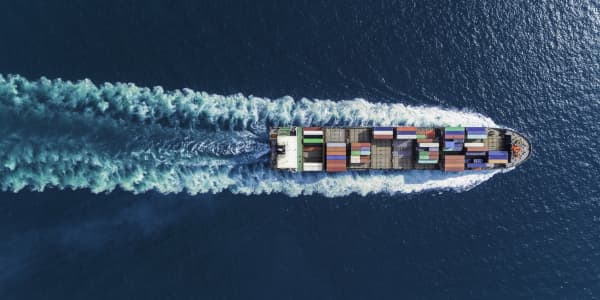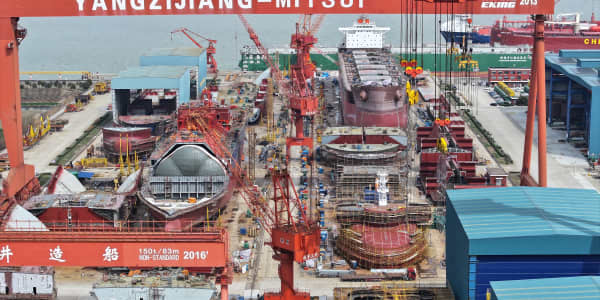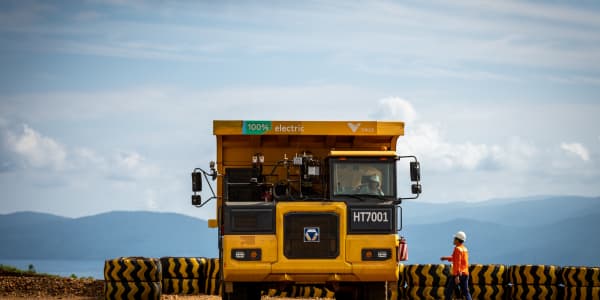It's been a slow summer for shipping routes from Asia to Europe and beyond — and hopes of a traditional peak season when holiday orders are imported are fading.
As firms making goods from apparel to electronics hold excess stock, there's less of a demand to ship products. This means some vessels are waiting in ports because of sailings being "blanked," or canceled.
MSC, the world's largest container company, canceled last week's voyage of the 366 meter long MSC Deila from Asia to northern Europe due to "slowing demand" on the route, it said on its website.
The massive vessel can carry 14,000 20-foot shipping containers (known as twenty-foot equivalent units, or TEU) and its sailing was also canceled the week before. "We are arranging a contingency plan with alternative services," MSC added. In late July, the company also blanked a scheduled sailing of the MSC Topaz on a similar route.
"Carriers will be doing … 'capacity management,' which means laying up ships," said Sanne Manders, president of ocean and air at freight broker Flexport, speaking to CNBC by video call. "If you fly to Singapore, you'll see all these ships outside the port … A lot of ships are parked there waiting till there are better yields," he added.
The blank sailings come as large shipping companies' latest earnings plunged. Last month, CMA CGM said its EBITDA (earnings before interest, taxes, depreciation and amortization) for the second quarter was down 73% to $2.6 billion compared to the same time last year, while Hapag-Lloyd's first-half EBITDA was down to $3.8 billion from $10.9 billion for the same period in 2022.
Maersk reported a sharp fall in its second-quarter profit before interest, tax, depreciation and amortization of $2.91 billion, well below the record $10.3 billion for the same quarter in 2022.
More capacity
"Looking at the next couple of months, there's still a lot of capacity going to be added specifically on the ocean side," Manders said. "And that will keep rates ... severely under pressure," he told CNBC.
Indeed, shipping companies ordered record numbers of vessels after the Covid-19 pandemic brought them "enormous" amounts of excess cash, according to investment firm Bernstein in a research note published last week. "The addition of hundreds of thousands of TEUs by the biggest shipping lines will likely keep rates from sustained expansion in the near to medium-term," Bernstein's analysts said.
"Freight rates from Far East to North Europe have by now been under significant pressure for a little over a year," according to according to Niels Rasmussen, chief shipping analyst at the Baltic and International Maritime Council (BIMCO), in an email to CNBC.
Spot container rates reported by the Shanghai Shipping Exchange were down nearly 90% for the three-month period March to May, when compared with the same period in 2022, Rasmussen added.
"Rather than concluding that volumes are weak, we therefore find it more accurate to conclude that liner operators have been unable or unwilling to adjust ship capacity to actual demand," he added.
Excess stock
Flexport, which is at 10th place in CNBC's Disruptor 50 list, regularly surveys customers on how much stock they're holding.
"When we looked in March, there was 62%, saying, I have way too much, or I have too much. In May, it went down to roughly just over 40%. But in July, it's still just over 40%. So, what we're still looking at is high inventory levels, which will keep imports relatively modest," Manders said.
The electronics, high tech and clothing industries have "way too much" stock, he added, while furniture companies are holding about the right amount. "We'll probably need the holiday season to clear through these inventories," Manders said.
Blank sailings have been common for several years, according to Simon Heaney, a senior manager for container research at maritime consultancy Drewry.
"The container market is in the middle of a demand slump so blank sailings are once again being used as a bad-aid to try and balance the market. Excess inventory, along with weak retail sales, are indeed part of the reason for the downturn in shipments," Heaney said in an email to CNBC.
The firm recorded 13 blank sailings on Asia to Europe routes in July, (during the same month last year Drewry counted 18) and expects similar figures for August and September.
Bernstein said U.S. retailers were holding $778 billion of inventory in May, the highest level since 2019. "A peak season is far from assured," its analysts added.
Long-term trend
While excess capacity means retailers moving goods from Asia to Europe can get a good deal on shipping rates right now, supply chain management is getting more complex, according to Manders, with retailers sourcing from many more locations in Asia than they used to.
"On the destination side, the consumer expects delivery within a day ... so [retailers] actually need to have all kinds of locations closer to the consumer [as well]," he added.
In the longer term, Manders expects ocean freight volumes to increase, while air freight will decline, due in part to better planned supply chains.
Customers fly goods for three main reasons, he said: If they're high value, because they're perishable or when there is a surge in demand. "In the fourth category is everyone who just screws up in their planning. And that's a big category. For the first three, air is extremely relevant. For the fourth one, if you do better planning ... you might actually be able to peel some off and do some air to ocean conversion," Manders said.
- CNBC's Elliot Smith contributed to this report.




